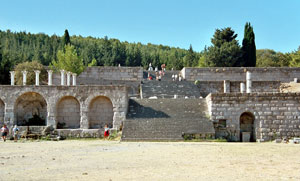Hippocrates & his oath
 The cult of the Greek God of healing, Aesculapius, led to the formation of healing temples throughout Greece in the third century BC.
The cult of the Greek God of healing, Aesculapius, led to the formation of healing temples throughout Greece in the third century BC.
Read more on Wikipedia about Aesculapius
It is likely that these were places of medical learning as well.
There were, according to written records, major medical schools at Kos (pictured right), Knidos and Epidauros.
 The Works of Hippocrates
The Works of Hippocrates
Medicine in Ancient Greece is most closely associated with the works of Hippocrates (c 496BC – 399BC). Although there is some controversy about how much of this writing was actually by Hippocrates, it certainly does contain some early urological facts.
For example:
- urine is made in the kidneys and flows into the bladder;
- blood in the urine comes from the kidneys or bladder;
- strangury, dysuria and anuria are separate symptoms; and
- urinary symptoms are caused by diseases of the bladder, kidneys or urethra.
The works of Hippocrates contain the first description of uroscopy (the visual examination of the urine to make a diagnosis) and, of course, mention of “cutting for the stone”.
 The Hippocratic Oath
The Hippocratic Oath
Contrary to popular belief, the Hippocratic Oath (pictured, right) has not been taken by newly-qualified UK doctors for many years.
Read more about the Hippocratic Oath
However, the speciality of urology was indirectly recognised in the Oath. Although the true meaning of “I shall not cut for the stone” in the Hippocratic Oath is not entirely clear, it tends to suggest that physicians and surgeons were regarded as separate practitoners, even in ancient Greece.
The subsequent phrase, “I shall leave this to practitioners of that art” suggests that either bladder stone specialists or urologists were already practising in the 5th century BC.
Translated text of the Oath
I swear by Apollo the physician, and Asclepius, and Hygieia and Panacea and all the gods and goddesses as my witnesses, that, according to my ability and judgement, I will keep this Oath and this contract:
To hold him who taught me this art equally dear to me as my parents, to be a partner in life with him, and to fulfill his needs when required; to look upon his offspring as equals to my own siblings, and to teach them this art, if they shall wish to learn it, without fee or contract; and that by the set rules, lectures, and every other mode of instruction, I will impart a knowledge of the art to my own sons, and those of my teachers, and to students bound by this contract and having sworn this Oath to the law of medicine, but to no others.
I will use those dietary regimens which will benefit my patients according to my greatest ability and judgement, and I will do no harm or injustice to them.
I will not give a lethal drug to anyone if I am asked, nor will I advise such a plan; and similarly I will not give a woman a pessary to cause an abortion.
In purity and according to divine law will I carry out my life and my art.
I will not use the knife, even upon those suffering from stones, but I will leave this to those who are trained in this craft.
Into whatever homes I go, I will enter them for the benefit of the sick, avoiding any voluntary act of impropriety or corruption, including the seduction of women or men, whether they are free men or slaves.
Whatever I see or hear in the lives of my patients, whether in connection with my professional practice or not, which ought not to be spoken of outside, I will keep secret, as considering all such things to be private.
So long as I maintain this Oath faithfully and without corruption, may it be granted to me to partake of life fully and the practice of my art, gaining the respect of all men for all time. However, should I transgress this Oath and violate it, may the opposite be my fate.
The original oath in Greek
For those of you who received a classical education, the full text in its original Greek is shown below:
ὄμνυμι Ἀπόλλωνα ἰητρὸν καὶ Ἀσκληπιὸν καὶ Ὑγείαν καὶ Πανάκειαν καὶ θεοὺς πάντας τε καὶ πάσας, ἵστορας ποιεύμενος, ἐπιτελέα ποιήσειν κατὰ δύναμιν καὶ κρίσιν ἐμὴν ὅρκον τόνδε καὶ συγγραφὴν τήνδε:
ἡγήσεσθαι μὲν τὸν διδάξαντά με τὴν τέχνην ταύτην ἴσα γενέτῃσιν ἐμοῖς, καὶ βίου κοινώσεσθαι, καὶ χρεῶν χρηΐζοντι μετάδοσιν ποιήσεσθαι, καὶ γένος τὸ ἐξ αὐτοῦ ἀδελφοῖς ἴσον ἐπικρινεῖν ἄρρεσι, καὶ διδάξειν τὴν τέχνην ταύτην, ἢν χρηΐζωσι μανθάνειν, ἄνευ μισθοῦ καὶ συγγραφῆς, παραγγελίης τε καὶ ἀκροήσιος καὶ τῆς λοίπης ἁπάσης μαθήσιος μετάδοσιν ποιήσεσθαι υἱοῖς τε ἐμοῖς καὶ τοῖς τοῦ ἐμὲ διδάξαντος, καὶ μαθητῇσι συγγεγραμμένοις τε καὶ ὡρκισμένοις νόμῳ ἰητρικῷ, ἄλλῳ δὲ οὐδενί.
διαιτήμασί τε χρήσομαι ἐπ᾽ ὠφελείῃ καμνόντων κατὰ δύναμιν καὶ κρίσιν ἐμήν, ἐπὶ δηλήσει δὲ καὶ ἀδικίῃ εἴρξειν.
οὐ δώσω δὲ οὐδὲ φάρμακον οὐδενὶ αἰτηθεὶς θανάσιμον, οὐδὲ ὑφηγήσομαι συμβουλίην τοιήνδε: ὁμοίως δὲ οὐδὲ γυναικὶ πεσσὸν φθόριον δώσω.
ἁγνῶς δὲ καὶ ὁσίως διατηρήσω βίον τὸν ἐμὸν καὶ τέχνην τὴν ἐμήν.
οὐ τεμέω δὲ οὐδὲ μὴν λιθιῶντας, ἐκχωρήσω δὲ ἐργάτῃσιν ἀνδράσι πρήξιος τῆσδε.
ἐς οἰκίας δὲ ὁκόσας ἂν ἐσίω, ἐσελεύσομαι ἐπ᾽ ὠφελείῃ καμνόντων, ἐκτὸς ἐὼν πάσης ἀδικίης ἑκουσίης καὶ φθορίης, τῆς τε ἄλλης καὶ ἀφροδισίων ἔργων ἐπί τε γυναικείων σωμάτων καὶ ἀνδρῴων, ἐλευθέρων τε καὶ δούλων.
ἃ δ᾽ ἂν ἐνθεραπείῃ ἴδω ἢ ἀκούσω, ἢ καὶ ἄνευ θεραπείης κατὰ βίον ἀνθρώπων, ἃ μὴ χρή ποτε ἐκλαλεῖσθαι ἔξω, σιγήσομαι, ἄρρητα ἡγεύμενος εἶναι τὰ τοιαῦτα.
ὅρκον μὲν οὖν μοι τόνδε ἐπιτελέα ποιέοντι, καὶ μὴ συγχέοντι, εἴη ἐπαύρασθαι καὶ βίου καὶ τέχνης δοξαζομένῳ παρὰ πᾶσιν ἀνθρώποις ἐς τὸν αἰεὶ χρόνον: παραβαίνοντι δὲ καὶ ἐπιορκέοντι, τἀναντία τούτων.
← Back to Time Corridor